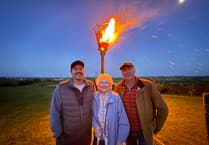AWARD-winning cider maker, Sandford Orchards, is proud to announce that it is working with scientists from Bristol University to identify and preserve ancient apple varieties in their beautiful historic orchards in Mid Devon.
This ground breaking research aims to fingerprint thousands of cider apple trees in order to locate and propagate unique and threatened varieties.
Barny Butterfield, Chief Cidermaker at Sandford Orchards said: “Apples are at the heart of everything that we do. Our cider mill is the oldest working mill in the UK and some of our orchards are centuries old.
"We take our stewardship of these precious natural wonders very seriously and we jumped at the opportunity to unlock some of the secrets of these orchards that have long been forgotten. By mapping our apple trees we will be able to preserve them for future generations, ensure diversity in our stock and secure many more centuries of cider enjoyment.”
DNA TESTING
Keith Richards, Professor of Crop Genetics at Bristol University, is leading the new research which aims to identify and map the nation’s traditional cider apple varieties. By punching a small hole in leaves from individual trees, his team is able to collect samples for DNA testing, while geographically tagging the particular tree using the What3Words geo-positioning system.
The team has spent the summer taking DNA samples from hundreds of Sandford Orchards’ apple trees and has been surprised by the varieties being grown in these older orchards in the Crediton area, which has long been famed for its cider.
Professor Richards explains: “We thought that, being well-established orchards, we might only find a few different cider apple varieties in each, but that has not been the case. We have fingerprinted around 400 samples and I believe there will be a great many different varieties, many of them unique.”
Barny is awaiting the results of the research with bated breath. He says: “By using genetic-fingerprinting techniques we are able to wind back the clock. We can map a particular variety and see where it crops up in places like Devon and Somerset.
"That allows us to start building the picture so that hopefully we can reclaim some old varieties which make great cider.
"You only need one apple tree to propagate a whole new orchard so once we have identified key varieties that we would like to increase our stock we can start planning for the future.”
He continues: “Using the new techniques we will find apples that could be important in changing the type of ciders we make.
DIVERSITY
“Each apple variety will behave in a certain way according to the local conditions and, by having a much better knowledge of the rich diversity of trees in our orchards, we might find wonderful cider apples which are ready to take on the challenge of a changing environment.”
As well as the environmental benefits of preserving a diverse range of apple trees for the future, Barny is also thrilled at the prospect of a renaissance of delicious single batch ciders.
He explains: “So it might be that we find a tree that is the only one of its kind in the whole country. Or perhaps there’s just one in my orchard but a few elsewhere.
"The great thing is, because we are mapping the trees, I am going to be able to collect enough fruit from those trees to make a small amount of single-apple cider.”
Barny continues: “We are keenly awaiting the results of this research but whatever Professor Richards and his team uncover the outcome can only be positive for the environment and for cider-lovers.”
WERE TWO CIDER WORKS IN CREDITON
Partly thanks to cider, the crews of the British Navy did not get scurvy. Cider is probably the oldest drink in this country with records going back at least 3,000 years, says Barny Butterfield.
Until the 1950s more than 1,000 tons of apples were grown in the Crediton area and there were two cider works in the town. One is still being used, Sandford Orchards creating their own ciders there with recycling very much to the fore.
Now it is the heritage of the cider apple trees that is fascinating Barny. “Our Devon Mist and Devon Red would probably have come from orchards around here, certainly if you are drinking Devon Red,” he said. We were near Shobrooke.
Barny explained that many apple trees have certain areas where they grow best. By investigating their heritage, he is trying to find these places.
“I am sure we have lost scores of cider apple trees but perhaps in the nick of time we can save some,” he says. “A nursery might not have or know the apple tree that grows best in this valley. This is the really exciting stuff, finding out. It takes less energy to grow things in the right place.”
He says there is room for organic orchards which do a good job in stabilising soil. That soil is pure gold compared to that which has been ploughed for years, he says. He added that when people see them spraying the trees, they are spraying a foliar feed.
ENERGY
As for the energy, Sandford Orchards work with another business that uses the leftover pulp from squashing the apples in a biodigester where it is converted into energy and CO2 which Barny buys back to put the bubbles in cider.
Rainwater from the roof is used to wash the apples, being circulated to use over and over again.
We went to a biggish orchard near Shobrooke which Barny said had been there “for ever”, when it would have been a mix of new trees, trees in their prime and others that had gone over.
They then become prime habitats, earwigs are among the biggest eaters of aphids. Even the aphids are part of the chain that keeps the cider apples coming.
A tree, perhaps 200 years old, that had “given up the ghost” had become a haven for woodpeckers to dig in for grubs, all adding to the rich wildlife there.
AWARDS
• Sandford Orchards recently scooped two awards at the World Cider Awards for its "cider done right".
The General scooped a gold and Sandford Reserve received a silver. Both ciders are from Sandford Orchards vintage collection, which was launched earlier this year.?Founded in 2002, independent, family-owned Sandford Orchards is based in Crediton in the oldest working cider mill in the UK. The area has long been known as one of the most fertile parishes in all of Britain, both for its grasslands and its orchards. Crediton’s “Redlands” boast a unique microclimate, sheltered between Devon’s huge moors, long hours of warm sunshine and mineral rich soils produce the most flavoursome apples for cider imaginable.
Combining tradition and innovation, Sandford Orchards produces an award-winning range of core session ciders including Devon Red, Devon Dry and Devon Mist and fruit ciders; blackberry flavoured Fanny’s Bramble, Berry Lane using perfectly ripe raspberries, Old Blossom made from delicate Elderflower and an invigorating and zingy Cider Ginger.





Comments
This article has no comments yet. Be the first to leave a comment.